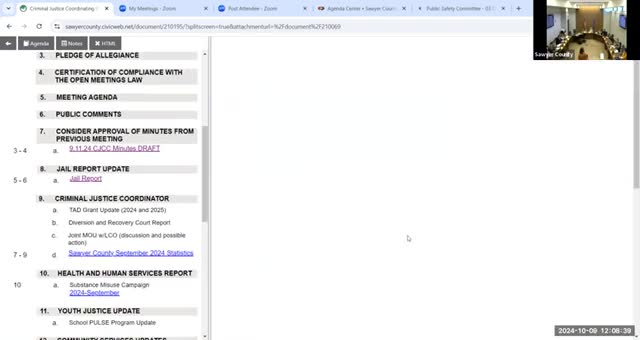Justice Point expands programs to tackle substance use crisis
October 09, 2024 | Sawyer County, Wisconsin
Thanks to Scribe from Workplace AI , all articles about Wisconsin are free for you to enjoy throughout 2025!

This article was created by AI using a video recording of the meeting. It summarizes the key points discussed, but for full details and context, please refer to the video of the full meeting. Link to Full Meeting
The monthly statistics for September revealed that the number of active cases in the Justice Point programs, which include pretrial supervision, diversion, and treatment court, remained stable. Notably, there are currently 39 individuals on the waitlist for pretrial supervision. Efforts are underway to contact these individuals and transition them to active supervision, with plans to eliminate overcapacity memos once the waitlist is reduced to ten.
Justice Point is also preparing to request two Treatment Alternatives and Diversion (TAD) grants from the Department of Justice, each amounting to $150,000. This marks an increase from previous years, as the recovery court program is now fully implemented and requires additional training and resources. A county match of $75,000 is necessary, which will be met through contributions from local organizations and in-kind services.
In addition to TAD grants, the meeting discussed the Reaching Rural initiative, a nationwide effort aimed at enhancing support for individuals with substance use disorders and mental health challenges in rural areas. Following participation in planning sessions, Justice Point is now eligible to apply for a full grant to develop community resources and peer support systems, with a submission deadline of October 15.
Lastly, the Building Bridges family initiative, which aims to strengthen community ties and support for families, has been approved, further demonstrating the commitment to enhancing local resources and collaboration among various stakeholders.
Overall, the meeting underscored the ongoing efforts to secure funding and implement programs that address the needs of individuals in the justice system, while fostering community engagement and support.
Converted from Criminal Justice Coordinating Council 2024 10 09 meeting on October 09, 2024
Link to Full Meeting
Comments
View full meeting
This article is based on a recent meeting—watch the full video and explore the complete transcript for deeper insights into the discussion.
View full meeting
